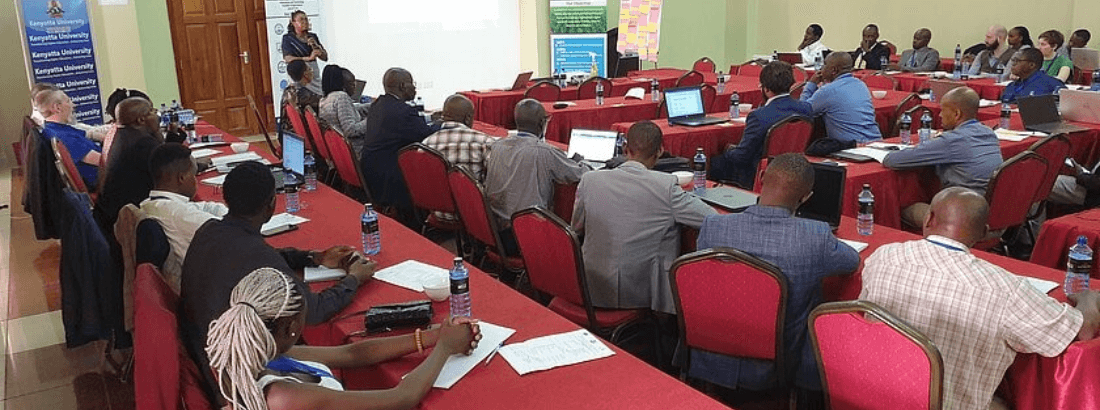Associate Professor
Carsten Nico Portefée Hjortsø
Department of Food and Resource Economics
University of Copenhagen
We seek to equip graduates with employability and entrepreneurial skills, thereby addressing food security, unemployment, and economic development challenges.

Kick-off event in Nairobi, February 2024. Photo: Carsten Nico Portefée Hjortsø
The UPLIFT-Ag project aims to enhance the effectiveness of higher education institutions (HEIs) in Kenya, Rwanda, Burundi, and Zimbabwe by fostering strong partnerships with the agriculture industry.
The primary goal is to improve the quality of agricultural education through innovative teaching methods, industry collaboration, and curriculum reform. The project seeks to equip graduates with employability and entrepreneurial skills, thereby addressing food security, unemployment, and economic development challenges.
By establishing and strengthening innovation incubation centers and technology transfer offices, UPLIFT-Ag aspires to drive impactful research and technology commercialization in the agricultural sector.
The UPLIFT-Ag project is organized into five work packages, each led by a specific partner institution, ensuring a collaborative and structured approach. The methodological design includes baseline analyses, capacity building, and the development of innovative curricula and teaching methods.
By integrating industry roles in teaching and establishing incubation centers, the project aims to enhance the relevance and quality of agricultural education, fostering employability and entrepreneurship among graduates. This approach directly addresses the identified gaps and aligns with the project’s research questions.
WP1: Project Management and Coordination This work package ensures effective day-to-day management, coordination, and reporting of the project. It includes managing data, ensuring compliance with ethical guidelines, quality assurance, risk management, and financial management. The goal is to maintain high standards and timely implementation of project activities.
WP2: HEIs-Industry Partnerships and Collaborations This work package aims to enhance partnerships between higher education institutions (HEIs) and industry. It involves assessing current capacities, organizing engagement forums, building capacity for effective collaboration, and improving management systems and policies to support these partnerships. The objective is to create sustainable and impactful collaborations for teaching, research, and technology transfer.
WP3: Improved Teaching Methods and Innovative Curricula This work package focuses on identifying and addressing gaps in current agriculture curricula. It involves developing and testing new teaching methods, creating innovative curricula that emphasize employability and entrepreneurship, and building capacity among HEI staff and industry partners. The goal is to modernize agricultural education to better meet industry needs.
WP4: Innovation and Entrepreneurial Capacity Strengthening This work package aims to enhance the capacity of HEIs to manage and commercialize intellectual property. It includes developing operational guidelines and sustainable business models for incubators, building capacity for technology transfer, and supporting the incubation of green innovations and start-ups. The objective is to foster a robust innovation ecosystem within HEIs.
WP5: Communication, Dissemination, and Exploitation This work package focuses on promoting the project’s activities and results. It involves developing a communication and dissemination plan, building capacity for effective use of digital and non-digital media, and establishing a web portal for sharing project outputs. The goal is to maximize the impact and visibility of the project’s achievements.
Chirinda, N., Abdulkader, B., Hjortsø, C. N., Aitelkadi, K., Salako, K. V., Taarji, N., Mhada, M., Lamdaghri, Z., Romanova, G., Assogbadjo, A. E., Chadare, F. J., Saidi, M., Sassi, M., Mugonola, B., Gogo, E. O., Ssekandi, J., Okalany, E., Egeru. A., Mshenga, P. M., & Chfadi, T. (2024). Perspectives on the integration of agri-entrepreneurship in tertiary agricultural education in Africa: insights from the AgriENGAGE project. Frontiers in Sustainable Food Systems, 8:1348167. DOI: 10.3389/fsufs.2024.1348167.
Hernández-Chea, R., Mahdad, M., Minh, T. T., & Hjortsø, C. N. (2021). Moving beyond intermediation: How intermediary organizations shape collaboration dynamics in entrepreneurial ecosystems. Technovation, 108, 102332. DOI: https://doi.org/10.1016/j.technovation.2021.102332.
Alexander, I. K., & Hjortsø, C. N. 2019. Sources of complexity in participatory curriculum development: An activity system and stakeholder approach to the analyses of tensions and contradictions. Higher Education. DOI: 10.1007/s10734-018-0274-x.
Hjortsø, C. N., Alexander, I. K., & Hernandez Chea, R. R. (2017). Experiences and lessons learned from the UniBRAIN Agribusiness Incubation Programme. Department of Food and Resource Economics, University of Copenhagen. IFRO Report, Nr. 266.
Hjortsø, C.N., & Meilby, H. (2013). Balancing research and organizational capacity building in front-end project design: Experiences from Danida’s ENRECA programme. Public Administration and Development, 33(3), 205-220.
Hjortsø, C. N. (2010). Project management in research capacity building projects: A review of management experiences, challenges, and opportunities in ENRECA projects. Danish Development Research Network, Copenhagen.
Jensen, M. B., Hjortsø, C.N., Schipperijn, J., & Nik, R. (2007). Research capacity building through twinning: experiences from a Danish-Malaysian twinning project. Public Administration and Development, 27(5), 381-392.
Aagaard-Hansen, J., C. E. S. Larsen, N. Halberg, C. N. Hjortsø, Q. Gausset and J. Kabirizi, (2007). Main-streaming participatory and cross-disciplinary approaches in animal science research in developing countries. African Journal of Agricultural Research, 2(4), 119-130.
| Name | Title | |
|---|---|---|
| Carsten Nico Portefée Hjortsø | Associate Professor |
|
| Nerea Turreira Garcia | Assistant Professor |
|
| Thorkild Nielsen | Teaching Associate Professor |
|